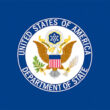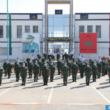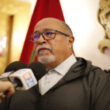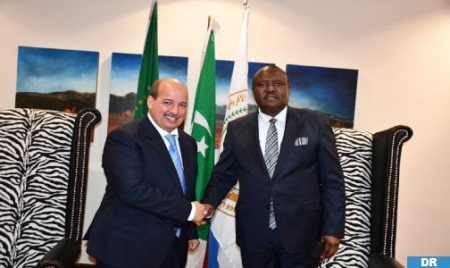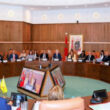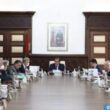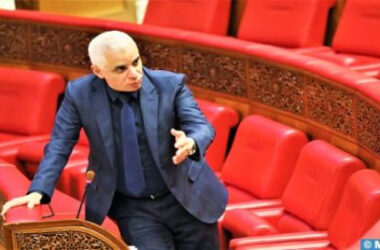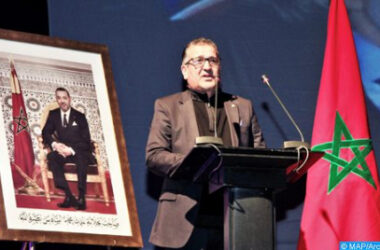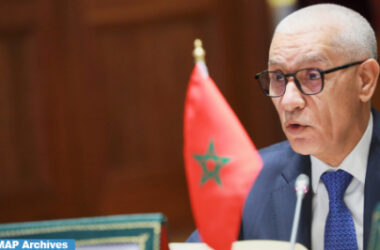Speaking at the opening of the second ordinary session of the sixth parliament of the Pan-African Parliament (PAP) at its headquarters in Midrand, a suburb of Johannesburg, Mayara said this important continental project will also enable the creation of a large number of job opportunities for the benefit of young people and save 30 million Africans out of extreme poverty and improve the income of 68 million people, while increasing continental wealth by 450 billion dollars.
Therefore, and according to an ambitious methodology, Morocco has worked to contribute to build a continental model of “common development” through a set of integrating projects and programs in a large number of countries of the continent, concerned with the development of infrastructure, university education and vocational training, enhancing food and energy sovereignty, health security, valorizing internal resources, and strengthening industrial systems, he underlined.
He said that the Kingdom of Morocco is also working to exchange experiences and best practices related to economic and development programs, alongside the strengthening of the financial and banking systems of a large number of the continent countries. This, he added, enabled the increase in the total value of Morocco’s bilateral trade with African countries by 9.5 percent as an annual average.
In addition Mayara commended the organization of the current parliament session by the African Parliament under the title of “Accelerating the Implementation of the African Continental Free Trade Area (AfCFTA)”, which comes in perfect harmony with the theme of the African Union for the year 2023. This will make the current meeting a “working session” and a main station for contributing to the success of the great continental economic process that aims to establish the largest free trade area in the world, with a market made up of about 1.3 billion people and a combined domestic product of about 3.4 trillion dollars, he added.
He recalled, in this regard, that during the exceptional summit of Heads of State and Government of the African Union in Kigali on the Continental Free Trade Area, His Majesty King Mohammed VI, may God assist him, had said: “The establishment of a free trade zone at the continental level would contribute to mobilizing energies, developing expertise and stimulating creative thinking, and responding in particular to the real ambition of our youth to build a strong and integrated African continent”.
In line with the spirit of cooperation, solidarity and synergy that is at the heart of the doctrine of cooperation between the Kingdom of Morocco and its African brothers, Morocco is working on investing in order to enhance continental food security by accompanying a group of African countries in building advanced agricultural strategies to strengthen food sovereignty, enhance the ability to compete in international agriculture and get the access to new markets, he pointed out.
The speaker of the House of Advisors noted that Morocco is also working, through the Chérifien Office of Phosphates, to develop an advanced continental value chain that will enable Africa, within years, to have fair and equitable access to sufficient quantities of fertilizers.
“My country adopts, a clear vision to implement projects that will change the agricultural appearance of the continent and enhance its food security, the most prominent of which is the work to establish an industrial platform for the production of fertilizers in Ethiopia at a cost of 3.7 billion dollars and with a production capacity of about 2.5 million tons annually of fertilizers destined for the local and export markets in addition to opening a factory in Ghana, which will be dedicated to the manufacture of fertilizers, and a second factory in Nigeria, which will be dedicated to the manufacture of ammonia used in agricultural fertilization,” he said.
Processes of Implementation of AfCFTA at Heart of Morocco’s Interests (Upper House Speaker) 2/2
Text
On the energy level, Morocco and the Federal Republic of Nigeria are working on the completion of a gas pipeline between the two countries that passes through a group of countries in the west of the continent. It is an ambitious initiative to value the capabilities of African resources, reshape the regional energy map, enhance the logistical and competitive capabilities of African gas, and strengthen its position in the European market, he stressed.
Mayara said that all these initiatives are an expression of the faith of the Moroccans and their king in the principles of South-South cooperation, solidarity and synergy between the countries of the African continent. “It is not a new, temporary option or is linked to a specific file, rather, it is a reference doctrine in Moroccan diplomacy since independence,” he added.
This doctrine, he said, was manifested in hosting Morocco, supporting and training the liberation armies of many African countries, including Algeria, Angola, Mozambique and Cape Verde, to combat colonialism, as well as supporting African liberation movements, foremost of which is the endeavor of the great African leader Nelson Mandela to liberate his country from the apartheid system after his military training in Morocco in 1962.
It is in this perspective and in accordance with the Royal High Directions that all Moroccan institutions now place African action at the forefront of their priorities and interests, he noted, adding that it is the approach adopted by the Parliament of the Kingdom of Morocco in order to develop coordination with national parliaments, the African Parliament and regional parliaments.
“Actually, we extend our hands to everyone in order to exchange experiences and best practices, and work to confront the challenges facing our countries,” Mayara said.
He also expressed Morocco’s support for all “serious parliamentary initiatives, which aims to strengthen institutional cooperation and joint thinking on ways to emerge from continental parliamentary cooperation models that keep pace with the bilateral and multilateral dynamics, especially in order to face the challenges related to food security, water scarcity, the growing dangers of terrorist groups, armed movements and militias, combating the exploitation of children in armed conflicts, clandestine migration and human trafficking, in addition to the challenges of digitization, the fourth industrial revolution, confronting climate change and other issues of common interest at the continental and regional level”.
Morocco’s determination to develop cooperation and solidarity with all African brothers “is matched only by its similarity to the success of all the institutional projects that the African Union is working to implement, foremost of which is strengthening the role of the Pan-African Parliament as an actual expression of the continent’s slogan “One Voice, One Continent,” he stressed.
“This institutional development carried out by the African Union will not succeed without concerted joint efforts and strengthening unity and stability in all countries of the continent, according to a methodology that enables us to pass to the maximum development speed in a fair and equitable manner among all the components of our continental institutional family,” he underlined.


